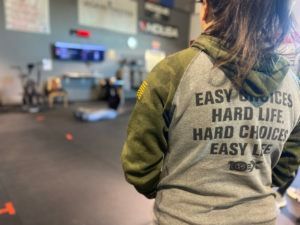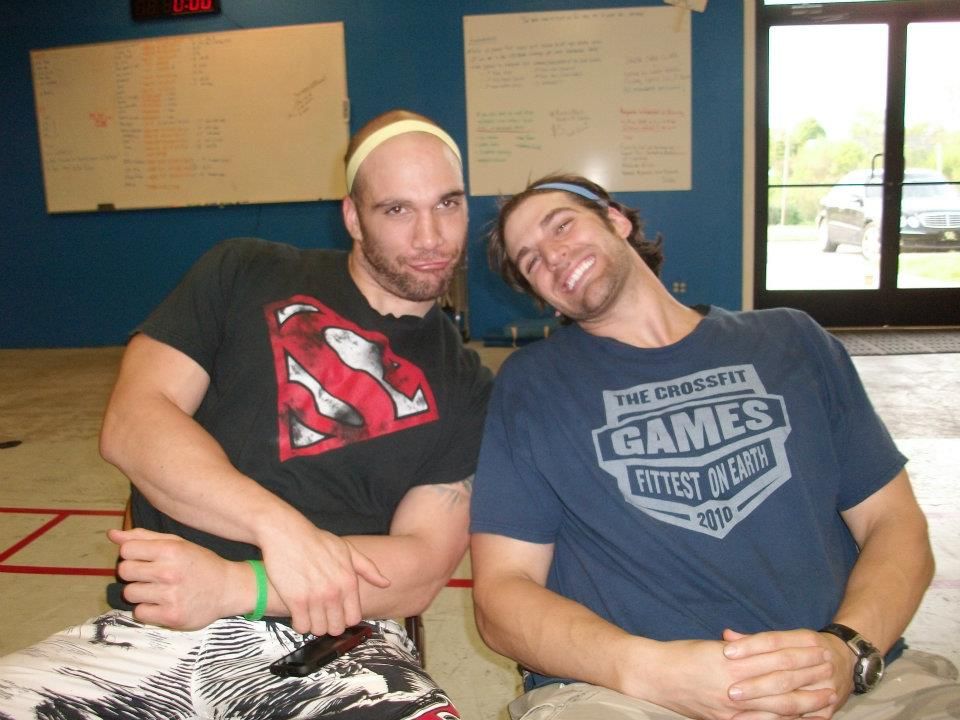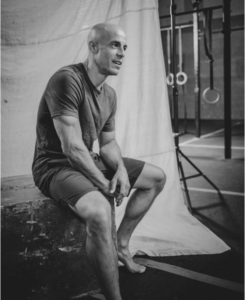You Are Not an Athlete: On Knowing Thyself
Openly, I consider myself a two-bit philosopher. Yes, I’m a nerd. I look for inspiration in language. I seek comprehension and knowledge from others’ experience. I ruminate. To me, our words and thought are powerful beyond measure. Socrates, known for his question-based method of teaching, is one of my favorite philosophers. If you’ve been around me much, you’ve likely posed some question relating to training, nutrition or, possibly, any topic. And, with great chance, I’ve offered an ambiguous, ‘let’s find out’ or ‘know thyself’ in response. If that’s been your experience, you may partially blame Socrates (and now, OPT). As a coach, I think I possess the capacity to understand my own faculties or, at a minimum, the limits of my understanding. Perhaps to combat the ‘meat head’ typecast, I’ve long embraced the path of a consummate learner, a struggling student of life.
A few months ago, and in a recent pursuit of fitness academia, [Justin and] I enrolled in OPEX’s Coaching Certificate Program (formerly OPT). In their own words, ‘[the CCP] is much more than a simple seminar, it is a 360 degree education that creates a distinction…it is in the OPEX DNA to pursue higher learning.’ As you may guess, being a self-proclaimed life-learner, I leapt at a chance to seek guidance and knowledge from OPEX’s founder, James ‘OPT’ FitzGerald (watch linked video, please). It’s my opinion that James stands atop the pinnacle in both the fitness and coaching arena. He is responsible for instilling the lion’s share of my programming convictions. You’ve possibly heard about the CrossFit Games? He was the first champion. James has been a pioneer in the strength and conditioning community for almost 20 years. In addition to developing a premier coaching certificate, he has worked with leaders in medicine to perform heart rate variability testing (HRV – look for articles on this soon), advanced the studies on recovery protocols and plays coach to a host of CrossFit Games and GRID athletes. Truly, he’s the maestro to a Beethoven-like symphony of fitness.
OPT – the coach’s coach. Terrible picture, fantastic experience.
“Coaches are more than educators. They are role models, life advisors, and leading community members that have far-reaching impacts on the lives of others.” – James FitzGerald
Shortly after registering for the the OPEX CCP modules, Paleo f(x) released their panel of presenters and, low and behold, James was among them. I was elated. The title of his talk, “You are NOT an Athlete”, garnered considerable interest. And, as expected, it was incredible. It granted me fresh vision and renewed zeal for coaching, for learning. I was left, and still am, inspired.
Preface: Again, the following summation is, to the best of my recollection, a fair analysis of James’ presentation. Please read with the understanding that my interpretations, while written in a sincere and most inspired manner, may not directly represent his assumptions. And, in the case that they contain falsehoods, I beg for both your and his pardon.
In a profound manner, James began his lecture with a question – why do we exercise? A few attendees offered their answers and a concerto of crickets chirped in harmony. For 99 percent of us, the goal of our exercise, is to ‘live long and prosper’, to possess physical capacity in whatever we pursue. On the tenants of exercise, James did share that anaerobic training is worthy of a deeper investigation and aerobic activity, the sustainable stuff you’ve heard me babble about, likely has a positive impact on cardiovascular health. According to him, exercise with proper prescription, proves beneficial for normal, obese, older, and diseased folks alike. Sure, these are all things we claim to know.
He ambiguously moved on to another question – why be an athlete? Again, audience members took a couple of throws at answering the mostly rhetorical question. However, a couple of general themes did emerge. As athletes, we participate in an attempt to win, to compete, to satisfy our alpha and competitive design. Sports, specifically team sports, provide an opportunity to contribute towards something beyond what we can individually achieve. Seemingly, these answers are obvious. Interesting, I thought. Was he leading us down a path to examine the validity of exercise or condemning exercise as a sport? Neither, as it would turn out.
After showing a slide containing images of an NHL player, an elderly couple, and a farmer, James posed another reverberating question – what does an exercise program for these people look like? The variety in response was too varied to recall. As an answer, James offered a most interesting health continuum:
vibrant -> balanced -> imbalanced -> athletic -> sick -> dead
The visual effect was rather influential. Yes, in terms of general health, James posits that ‘athletes’ are much closer to death than vibrant, thriving beings. The stress they endure to witness marginal adaptation (see: improve performance), often exceeds healthy levels. What?! Blasphemy! You mean to tell me Rich Froning is closer to being sick than he is optimal and balanced? In some of ways, yes. Here the training road diverges and, where all-too-often, we choose the misinformed path most-traveled, proclaiming ourselves to be ‘athletes’. Sure, it’s sexy to title ourselves as ‘athletes’, daily wading our way through multiple training sessions. Certainly, spending hours at the gym and logging miles on the track have a certain touch of romanticism. However, if our goal is to live long and prosper, yet, our training more closely resembles Rich’s, we’ve clearly zigged when we should’ve zagged. All this without mention of the countless concessions a serious athlete makes to sustain their training habits (see: 20+ remaining hours of the day centered on sleep, food, recovery, social life, etc).
It’s here in which James’ Socratic and most philosophic nature subtly presented itself to me. Simply, beautifully, and without waiver, he teaches self-examination. Why do we train? What are we doing to support that pursuit? Does it make us feel more alive? Does it inspire? Without proper vision, it’s all too easy to find ourselves muddled in the latest flavor of the [training] week – I saw X on Instagram or so-and-so did this on YouTube…it MUST work. Fast, we find ourselves in a dangerous dance of mimicry and misinformation – following an athlete’s programming lead without conforming to their less-visible and less-appealing lifestyle. It becomes a slippery, injurious slope and, I dare say, an unhealthy one.
Perhaps, it’s time we examine the dichotomy between an athletic pursuit and one aimed squarely at vibrance. So, are you an athlete or an exerciser? Good question. From my perspective, James wasn’t condemning athletic pursuits. No, not whatsoever. The emerging theme was rather clear: to encourage more thought on the path and direction of our training. In particular, what do we find in exercise that provides such fulfillment? There’s a rooted reason. Is it to live long and prosper or, contrastingly, chase performance? Endeavor to find those answers. And, then, does your training serve that purpose or are you just a slave to an unexamined pursuit? Sit, think, and dig into what you really want from your fitness, from your life. Then, if necessary, adjust the pitch of your sail. What are your aims? Start defining them and, then, come find me. I’ll be anxious to chat about it.
Still knowing nothing,
G-
The post You Are Not an Athlete: On Knowing Thyself appeared first on 10 Experience.
Previous Posts









